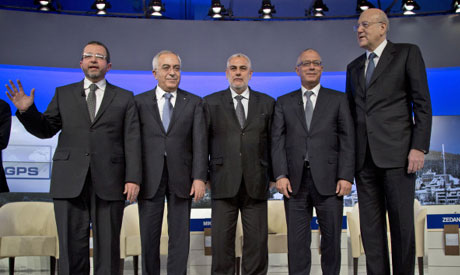
Hesham Mohamed Qandil, Egypt's PM, Salam Fayyad, PM of the Palestinian Authority, Abdelilah Benkirane, Morocco's Chief of Government Ali M. Ben Zedan, Libya's PM and Najib Mikati, Lebanon 's PM at the 43rd Annual Meeting of the World Economic Forum in Davos, Switzerland, Friday, Jan. 25, 2013 (Photo: AP)
Arab officials including Jordan's King Abdullah II called on global leaders Friday to take urgent action over Syria's civil war and provide "desperately needed" help to refugees.
At the World Economic Forum in Davos, a senior member of Saudi Arabia's royal family also called for Syria's opposition to be provided with sophisticated weaponry to help "level the playing field" in the country's conflict.
With the UN refugee agency announcing that more than 6,400 Syrian refugees had flooded across the border into Jordan in the previous 24 hours, King Abdullah said the international community needed to provide more support.
"I urge once more a stepped-up world response to the Syrian crisis," said the king, whose country is already hosting more than 300,000 Syrian refugees.
"The weakest refugees are struggling now just to survive this year's harsh winter. More international support is desperately needed," he told the annual gathering of the global elite in the Swiss ski resort of Davos.
He also urged international powers to come together to resolve the Syrian conflict through "a real and inclusive transition plan".
"Anything else invites fragmentation, extremist power-grabs and more conflict and instability, with a disastrous impact on the region and the world," the monarch said.
Experts and diplomats at Davos also urged more action, warning that Syria's conflict was threatening to settle into a long and bloody war.
"Today there are more than 60,000 dead... Can we wait until it's double that? Can we wait until it's triple that? This is a shame on all of us," said Prince Turki al-Faisal, the former Saudi intelligence chief and ex-envoy to the United States and Britain.
He said the global community needed to support Syria's opposition against President Bashar al-Assad, including by supplying them with weapons.
"I assume we are sending weapons, and if we are not sending weapons then it would be a terrible mistake on our part. In Syria you have to level the playing field," he said.
Ghassan Salame, dean of the Paris School of International Affairs and a former Lebanese culture minister, drew a comparison with his own country's troubled history, saying few expected its 15-year civil war to last for so long.
"We have something like a military stalemate on the ground and this can continue for a long time," he said. "Don't underestimate the possibility of a protracted war that takes us into years and years."
Calls were issued for more humanitarian assistance both inside Syria and in neighbouring countries, where more than 650,000 refugees have fled.
International Committee of the Red Cross chief Peter Maurer said aid groups were finding it difficult to deliver assistance inside Syria and that there needed to be "respect for international humanitarian laws and principles".
"We are definitely very much concerned by what we witness on the ground, by the expansion of the violence... by the depth of the crisis, and of course the difficulty to reach people in need," he said.
Later the premiers of Egypt, Lebanon, Libya, Morocco, Tunisia and the Palestinian Territories were to discuss the transformations wrought by the Arab Spring, as the second anniversary of Egypt's uprising was marked amid unrest.
Egyptian protesters torched a Muslim Brotherhood headquarters and clashed violently with police as mass rallies shook the country on the anniversary, after the secular-leaning opposition called for protests against the country's Islamist government.
In his speech, King Abdullah vowed to pursue Jordan's democratic reforms after Wednesday's parliamentary vote and to reach out to groups like the Muslim Brotherhood that boycotted the election.
The poll was touted as a focal point of pro-democracy moves by the king, but was shunned by Islamists who want wholesale reforms.
Preliminary results have shown that tribal leaders, pro-regime loyalists and independent businessmen were set to make strong showings in the election.
The king said the vote had been a "landmark" step, adding: "The challenge is how do I reach out to the oppositions that boycotted, that actually ended up being very small in numbers, to be part of this process."
Short link: